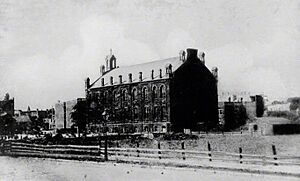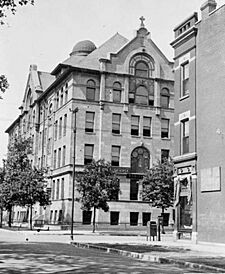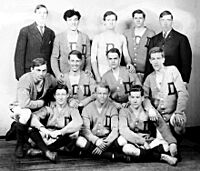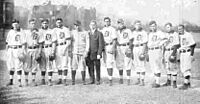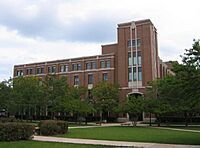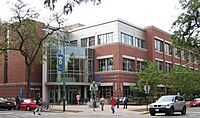DePaul University facts for kids
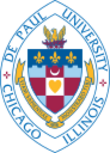 |
|
|
Former names
|
St. Vincent's College (1898–1907) |
|---|---|
| Motto | Viam sapientiae monstrabo tibi (Latin) |
|
Motto in English
|
I will show you the way of wisdom. |
| Type | Private research university |
| Established | 1898 |
| Founder | Congregation of the Mission |
|
Religious affiliation
|
Catholic (Vincentian) |
|
Academic affiliations
|
|
| Endowment | $1.08 billion (2024) |
| President | Robert L. Manuel |
|
Academic staff
|
862 full-time 930 part-time annually (Fall 2021) |
| Students | 21,348 (fall 2023) |
| Undergraduates | 14,374 (fall 2023) |
| Postgraduates | 6,974 (fall 2023) |
| Location |
,
,
U.S.
41°55′26″N 87°39′22″W / 41.924°N 87.656°W |
| Campus | Urban Main Lincoln Park Campus 36 acres (150,000 m2) Satellite Loop Campus (Downtown Chicago) |
| Academic term | Quarter |
| Colors | Royal blue Scarlet |
| Nickname | Blue Demons |
|
Sporting affiliations
|
NCAA Division I Big East Conference |
| Mascot | DIBS (Demon In a Blue Suit) |
DePaul University is a private Catholic research university in Chicago, Illinois. It was started in 1898 by a group of priests called the Vincentians. The university is named after Saint Vincent de Paul, a French priest from the 1600s.
DePaul became the largest Catholic university in North America in 1998. The school makes a special effort to welcome students who are the first in their families to go to college. It also helps students from families with less money.
The university has two main campuses, one in Lincoln Park and one in the Loop downtown. DePaul is known for its research programs. It has about 14,500 undergraduate students and 7,900 graduate students. Students at DePaul come from all over the world, representing more than 118 countries.
DePaul's sports teams are called the DePaul Blue Demons. They play in the Big East Conference. The men's basketball team has played in the NCAA tournament 18 times. The women's softball team has also been very successful, winning championships and playing in the NCAA tournament many times.
Contents
History
How It All Started
DePaul University was first called St. Vincent's College when it opened in 1898. It was founded by Vincentian priests to teach the children of Catholic immigrants. The school started with just 70 students but grew to 200 by 1903.
In 1907, the school changed its name to DePaul University. It made a big decision to allow men and women of any religion to attend. In 1911, DePaul started accepting female students, and the first women graduated in 1912. This made it one of the first Catholic universities where men and women could study together.
The university added a School of Music and a College of Commerce, which is now one of the oldest business schools in the country. It also opened a second campus in the Chicago Loop. By 1915, the Illinois College of Law joined DePaul and became its law school.
Growing and Changing
Even though money was sometimes tight, DePaul kept growing in the 1920s. The school's sports teams were called the "D-men" because of the "D" on their uniforms. This name later changed to the "Demons." The school color, blue, was added to create the name "Blue Demons."
During World War I and World War II, DePaul helped with the war effort. It offered its buildings for training soldiers and taught free classes for war industry workers. After World War II, many veterans used a government program called the G.I. Bill to pay for college. This caused DePaul's student numbers to jump from about 4,000 to over 11,000 in just a few years.
In 1942, Ray Meyer became the head basketball coach. He led the team for 42 years and took them to a national championship in 1945. The university later named its fitness center after him to honor his legacy.
In the 1960s, student groups like the Black Student Union were formed. They worked to make sure the concerns of Black, Latino, and other student groups were heard by the university.
Modern Times
In the 1980s, DePaul began a period of major growth. It launched a plan to improve its national reputation and increase the number of students. The university built many new buildings on both its Lincoln Park and Loop campuses. This included the John T. Richardson Library and several new dorms.
By the early 2000s, DePaul had about 23,000 students. It became the nation's largest Catholic university again. The school continued to build new facilities, like the Ray Meyer Fitness and Recreation Center and the Student Center.
In 2017, DePaul opened the Wintrust Arena. This large arena, which seats over 10,000 people, is the new home for the men's and women's basketball teams.
Campuses
DePaul has two main campuses in Chicago. Because the campuses are in the city and students get free public transportation passes, the university has a very low carbon footprint.
Lincoln Park Campus
The Lincoln Park Campus is the older and larger of the two. It feels like a traditional college campus, with green spaces and historic buildings. About 2,400 students live in the twelve dorms on this campus.
This campus is home to several colleges, including Liberal Arts and Social Sciences, The Theatre School, and the School of Music. It also has the John T. Richardson Library, the DePaul Art Museum, and Wish Field for sports.
A new Theatre School building opened in 2013. It has two theaters and modern workshops for students. The Student Center, which opened in 2002, is a popular spot for students to eat, study, and meet.
Loop Campus
DePaul's Loop campus is in the heart of downtown Chicago. It is close to the city's business district and the Art Institute of Chicago. The main building is the DePaul Center, which used to be a large department store. It is now home to the Driehaus College of Business.
The College of Law and the College of Computing and Digital Media are also located on the Loop campus. In 2004, DePaul worked with other universities to build the University Center of Chicago. This 18-story building is a dorm for 1,700 students from different schools.
What You Can Study
DePaul University has ten different colleges and schools, each focusing on different subjects.
- Driehaus College of Business: One of the oldest business schools in the U.S. Students can learn about business, finance, and how to start their own companies (entrepreneurship).
- College of Communication: For students interested in journalism, advertising, TV, and film. Students can work at the school's newspaper, The DePaulia, or its radio station, Radio DePaul.
- College of Computing and Digital Media (CDM): This college has top-ranked programs in video game design, animation, and film.
- College of Education: Prepares students to become teachers. Many graduates work in Chicago-area schools.
- College of Law: The law school is located on the Loop campus and has many well-known professors.
- College of Liberal Arts & Social Sciences: The largest college at DePaul. It offers degrees in subjects like history, English, psychology, and philosophy.
- College of Science and Health: This college offers degrees in subjects like biology, chemistry, nursing, and math.
- School of Music: Many teachers at the School of Music also play in the Chicago Symphony Orchestra. Students can study everything from classical music to jazz.
- The Theatre School: Founded in 1925, this is the oldest theater school in the Midwest. Students learn acting, costume design, and stage production.
- School of Continuing and Professional Studies: A special school for adult students who are returning to college.
Student Life
Student Media
DePaul has four student-run media groups. Good Day DePaul is a TV program, The DePaulia is the school newspaper, 14 East is an online magazine, and Radio DePaul is a 24-hour web radio station.
Athletics
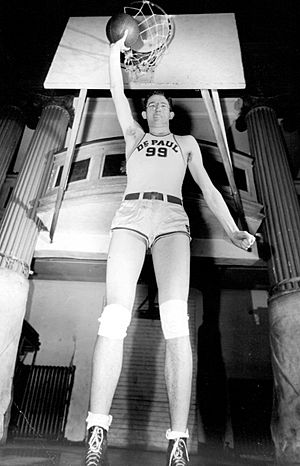
DePaul's sports teams are called the Blue Demons, and they compete in NCAA Division I in the Big East Conference. The mascot is a character named DIBS, which stands for Demon In a Blue Suit.
The men's basketball team became famous under coach Ray Meyer. He led the team to the Final Four in the NCAA tournament twice. The team won its only national title in 1945.
The women's basketball team is also very successful. They have played in the NCAA tournament 25 times and have won the Big East Conference tournament six times.
Other Connections
NASCAR
On June 24, 2025, it was announced that DePaul University would sponsor NASCAR driver Michael McDowell for the 2025 Grant Park 165 race in Chicago. The university's logo and colors were featured on his No. 71 car.
Notable Alumni
See also
 In Spanish: Universidad DePaul para niños
In Spanish: Universidad DePaul para niños


